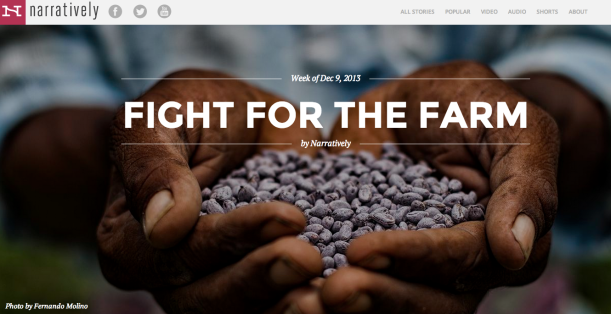For journalism, the internet has been a blessing and a curse simultaneously. Our attention spans are steadily declining, and few find the time to sit down and read a long-form article when they could be surfing 10 other sites. On the other hand, it has provided so many means to make e-magazines glossier, prettier and more interactive, and I always enjoy finding a new site that is dedicated to the lost art of “slow storytelling”. This is why I am so excited to share with you today: Narratively.
According to their ‘About‘ page,
Narratively slows down the news cycle. We avoid the breaking news and the next big headline, instead focusing exclusively on untold, human-interest stories—the rich, intricate narratives that get at the heart of what a place and its people are all about.
Each week, we explore a different theme and publish a series of stories—just one a day—told in the most appropriate medium for each piece. We might feature a longform article on a Monday, followed by an animated documentary on Tuesday, then a photo essay, an audio piece or a short documentary film. Every story gets the space and time it needs to have an impact—an approach we call “slow storytelling” or “slow journalism.”
And… guess what? The week of Dec 9, 2013, their theme was “Fight for the Farm“. Featuring 5 unique stories from different countries, different struggles, different ways to cope with the new challenges staying in agriculture has brought about.
First up, “The Not-So-Simple Life” by Whitney Light takes on the realities of urbanites chasing the dream of a life closer to nature and establishing an organic farm. It’s a candid and bittersweet piece and so real, unlike many accounts that seem to sugarcoat such a courageous step. Favorite quote:
“There’s a perception of farmers being the salt-of-the-earth, hardworking individuals, taking care of the world, fixing a bird with a broken wing. It’s kind of a romantic notion of a profession. But you either make money farming, you have another income to cover your losses, or you get out.”
Then, “Fracking Up a Storm” by Hayley Katzen is a first-person account of an Australian community’s fight to keep their land out of the grips of shale gas fracking companies who see quick profits where land owners see irreparable damage to their main source of income. Touching and infuriating at the same time. Favorite quote:
“This had ceased to be some intangible environmental issue I couldn’t get my head around. This was about women as wives and mothers and income earners. This was a human rights issue—one I could no longer pretend didn’t exist. Oh, how underrated are the psychological benefits of NIMBYism—to focus on your own backyard is to contain your worries and concentrate on your personal priorities.“
“The Booze Baron of the West Bank” by Aya Lowe tells the story of a Palestinian microbrewery and vinery constantly oscillating between hope and despair. Despite recent successes, their challenges to get a small business going in the realities of the West Bank seem daunting to say the least and reminded me of my post on farming in the Gaza strip – life in Palestine seems hard. Favorite quote:
“There are so many problems in the Middle East. But we don’t see it as a negative thing. We know people will come to Palestine. It’s the Holy Land, after all,” says Nadim, raising a glass of newly fermented wine to a bright and alcohol-filled Palestinian future.”
“Graves of Cotton” by Fernando Molina Cortes touches on the issue of increasing suicide rates among cotton farmers in India, many of which are highly indebted due to an unfortunate combination of engagement in high-input, expensive cotton seeds, the necessity to purchase other inputs like pesticides to go with them, and crippling droughts that destroyed the crops that were supposed to pay back the money. Many farmers then drink a bottle of the pesticides themselves, leaving their grieving families to deal with the debt and heartache. The story was a little melodramatic for my taste, but still very well-written, and illustrated by many touching pictures. Favorite quote:
“There is a constant sadness in her face that lends it the color of dry earth, and her broken smile cannot find a way to surge from deep within. Her twelve-year-old daughter will have to give up her teenage years and leave school, as many others do, to work in the fields. I can see in her young eyes the look of those who do not even dare to say aloud half of what they see coming upon them.“
And finally, “Romancing the Ranch” by Sandy Kirkpatrick lends a lighter-hearted finish to the series when relating little anecdotes of the life of a former banker-turned-rancher in Denver, Colorado, in the 1970s. It in no way belittles the steep learning curve involved when jumping into agriculture as a late bloomer, but ties in nicely with the first story as if to say “don’t despair. It will turn out fine.” Except they operated in a whole different market environment, with seemingly less outside pressure to perform or get out immediately. Food for thought on what we want food production to look like, really. Favorite quote:
“Enveloped as I was by such feelings, I still became aware of a new presence among us. The coyote’s silver-tinted coat matched the frosty brown grass, but his motion as he trotted out of the woods and down the hill attracted my eyes and Lib’s at about the same time. Across the fifty yards that separated us, we exchanged a look that said, Can you believe the beauty of this moment?“
Give longform and storytelling a chance this week! I promise you won’t regret it.
